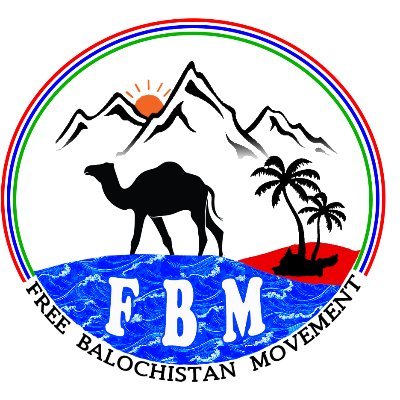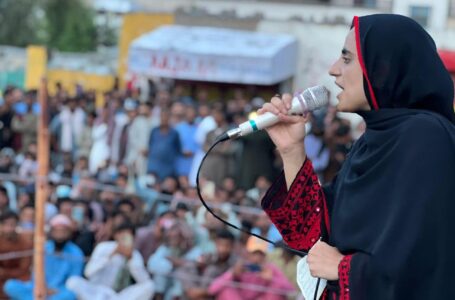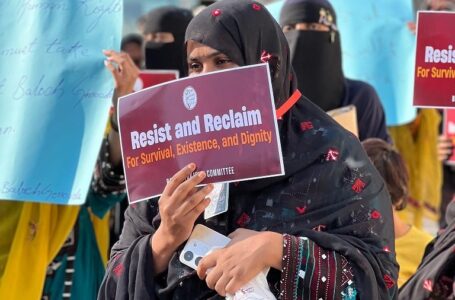FBM Holds Simultaneous Protests Against Pakistan’s Nuclear Tests on Baloch Land
FBM Holds Simultaneous Protests Against Pakistan’s Nuclear Tests on Baloch Land

LONDON: On the 27th anniversary of the nuclear tests conducted by Pakistan in the Chaghai district of Balochistan on May 28, 1998, coordinated demonstrations were held across multiple European countries.
Organised by the Free Balochistan Movement (FBM) and supported by the Pashtun Tahafuz Movement (PTM) and other rights groups, these protests aimed to draw international attention to the long-term environmental, health, and political consequences of the nuclear explosions, as well as to the broader human rights violations occurring in Balochistan.
United Kingdom: Protest Outside the British Prime Minister’s Residence, London
In London, the FBM UK branch held a protest outside the official residence of the British Prime Minister at 10 Downing Street. Baloch activists gathered with banners that read, “Pakistan Nuclear Weapons Are a Threat to World Peace”, along with other placards condemning human rights violations and calling for nuclear disarmament.
Dr. Shahzavar Baloch, Vice President of the Free Balochistan Movement, speaking to the media denounced Pakistan’s nuclear policies: “Pakistan uses its nuclear weapons as a bargaining chip in global diplomacy, as we have recently witnessed during India-Pakistan tensions. Its nuclear program is not a source of peace, but a regional threat, especially when combined with its sponsorship of religious extremism and terrorism against Balochistan, Afghanistan, and India.”
He further urged international non-proliferation and anti-nuclear organisations to: “Support an independent investigation into the radiation effects on the Baloch population and push for the dismantling of Pakistan’s nuclear weapons. These weapons are not only a threat to the region but to global peace and stability.”
The protest also called upon the UK government to address Pakistan’s human rights violations during bilateral engagements and consider sanctions related to nuclear safety and abuses in Balochistan.
Scotland: Demonstration at BBC Headquarters, Glasgow
In Glasgow, members of the Baloch and Pashtun communities held a protest outside the BBC Scotland office to mark the 27th anniversary of the Chaghai nuclear tests. The demonstration aimed to raise awareness of the devastating human and environmental impacts of those tests.
Protesters stated that on May 28, 1998, the Pakistani military conducted six nuclear explosions in the Ras Koh mountains of Chaghai district without the consent of the local population. The resulting radiation has caused long-term health crises in the region, including increased rates of cancer, hepatitis, and birth deformities.
They emphasized: “Balochistan is now a no-go area—not just for foreign journalists, but also for humanitarian agencies. It is under the grip of military operations, enforced disappearances, extrajudicial killings, and what we call a slow genocide.”
Protesters called on international media, especially the BBC, to report comprehensively on the worsening situation in Balochistan. They also demanded the release of detained leaders including Dr. Mahrang Baloch, Beebow Baloch, Gulzadi Baloch, Ali Wazir, Sabghatullah Baloch, and Beebagr Baloch, describing them as prisoners of conscience arrested on false charges.
Finland: Protest March from Parliament to Helsinki Central Library
In Helsinki, the Free Balochistan Movement organised a protest march on May 28, which began at the Finnish Parliament and concluded at the Helsinki Central Library. The Pashtun Tahafuz Movement (PTM) participated in solidarity with the Baloch cause.
At the library, protest leaders delivered powerful speeches. MB Marri Baloch, FBM’s Finland organiser, stated: “The May 28 nuclear explosions were not just scientific experiments—they were Punjabi state aggression on Baloch land. These radioactive explosions have caused widespread health devastation. Cancer and other chronic diseases have become common in the surrounding areas. This was nothing short of genocide.”
He further accused Iran of complicity:“Pakistan and Iran are jointly responsible for the genocide of the Baloch people.”
PTM leaders Shafiullah Yousafzai, Abdul Bari Barech, Banaras Khan, and Kaka General condemned Pakistan’s nuclear program as a means of ethnic cleansing: “Pakistan is not just the enemy of the Baloch—it is the enemy of all Afghans. The British divided our lands, and now Pakistan is finishing the job through genocide, military operations, and forced displacements.”
They made the following demands:
- Global awareness campaigns against the division of Baloch and Pashtun lands.
- Immediate investigations by international human rights organizations into abuses in Balochistan and drone strikes in Waziristan.
- Protection for PTM and Baloch leadership, who face serious threats inside Pakistan.
- Immediate release of all detained leaders and political activists.
Sadiq Raisani, a senior FBM member, closed the event by declaring May 28 a black day for the Baloch nation: “These nuclear tests poisoned our lands and waters. Cancer and hepatitis have increased drastically in Chaghai and nearby districts. Pakistan is also dumping used uranium in the Taunsa region, and its missile testing in Sonmiani has turned fertile land into a barren wasteland. These actions by Pakistan and Iran are historical crimes.”
He concluded: “The day is not far when Balochistan will be united and independent. That is the only path to peace and stability in this region.”
MB Marri Baloch thanked all participants and reaffirmed the movement’s commitment to globalising the Baloch cause.
Netherlands: Protest Outside the International Court of Justice (ICJ), The Hague
In The Hague, the FBM Netherlands branch held a peaceful protest outside the International Court of Justice (ICJ) from 1:00 PM to 2:00 PM. Baloch and human rights activists gathered with banners demanding international accountability for the 1998 nuclear explosions in Chaghai.
Bilal Marri Baloch, FBM Netherlands Branch’s Communication Officer, stated: “We are commemorating a day that remains a deep wound for the Baloch nation, May 28, 1998, when the Pakistani state carried out nuclear tests in Chaghai. This nuclear test is clear proof that Pakistan is an occupying state which, for the past 77 years, has brought nothing but oppression, exploitation, and nuclear devastation to Balochistan. While the Pakistani state celebrates this day as ‘Youm-e-Takbeer,’ we remember it for what it truly is, a day of shame.”
Shakoor Dad, another FBM member, added: “We appeal to the international community to recognize the occupied status of Balochistan and to immediately address the ongoing grave human rights violations. For decades, the Baloch people have suffered from enforced disappearances, extrajudicial killings, nuclear experiments, and systematic exploitation of their natural resources. These are clear violations of human rights.”
The protest called for independent investigations into the environmental and health impacts of the nuclear tests and urged international courts to hold Pakistan accountable. Baloch students, journalists and European human rights campaigners also joined the demonstration.
Germany: Protest at Ida-Ehre Platz, Hamburg
In Hamburg, the FBM Germany branch organised a protest at Ida-Ehre Platz to raise awareness about the impact of Pakistan’s nuclear tests and the broader crisis in Balochistan.
Protesters carried placards and banners, while distributing German-language pamphlets detailing the health and political ramifications of the 1998 nuclear tests.
Speakers included Mumtaz Baloch, Faris Baloch, Behzad Baloch, Ashfaq Baloch, Abu Bakar Baloch, and Azan Baloch. They condemned Pakistan for using Balochistan as a nuclear testing ground:
“These nuclear tests were not only environmentally disastrous but were carried out without the consent of the Baloch people. It has deepened their suffering and isolation.”
Faris Baloch added: “Pakistan’s nuclear ambitions have come at the cost of the Baloch people’s health, safety, and future. Thousands have been affected by radiation, yet the voices of the victims remain unheard by the international community.”
The event was moderated by Naveed Ahmed, who stressed the need for international solidarity with the Baloch struggle and called on European governments to investigate the long-term effects of Pakistan’s nuclear program.
These simultaneous demonstrations across five countries reflect a growing transnational movement demanding justice, environmental accountability, and political recognition for Baloch struggle for freedom.
Protesters called on international courts, media organisations, and governments to stop ignoring the plight of the Baloch people and to take urgent action against the nuclear legacy and continuing steady genocide in Balochistan at the hands of Iran and Pakistan.










